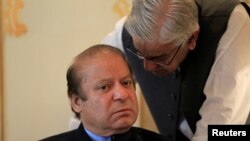Pakistan’s Supreme Court, in a landmark ruling Friday, disqualified former prime minister Nawaz Sharif and others from holding public office for lying and dishonesty.
Sharif, 67, resigned from office in July after the top court found him guilty of concealing a foreign source of income.
After Sharif’s ouster from office last year, his Pakistan Muslim League-Nawaz (PML-N) party elected Shahid Khaqan Abbasi as his successor to enable the party to complete its mandated five-year term due to end in June before the country holds new elections later this year.
Friday’s unanimous verdict by a five-judge panel of the highest court merely addressed an ambiguity over whether disqualifications handed down under relevant constitutional provisions requiring public office holders to be “truthful” and “honest” are for life or a specific time period.
But party loyalist and the state minister for information Maryam Aurangzeb swiftly rejected the verdict as a “conspiracy” against democracy in the country.
“This is the same joke that has been played on 17 elected prime ministers of Pakistan," she told reporters outside the court.
The minister stopped short of once again blaming the powerful military for orchestrating the judicial proceedings, saying it is the work of “those nameless, faceless and unknown people who determine the fate of elected prime ministers” in Pakistan.
The military, which has ruled the country for years through coups against elected governments, denies involvement.
Sharif’s party won the 2013 elections and brought him to power for a historic third time, though all of his terms ended abruptly and prematurely.
The former prime minister’s dismissal from office in July was based on corruption charges stemming from the 2016 Panama Papers, leaked documents from the Panamanian law firm Mossack Fonseca.
The trove of papers contained names of three of Sharif’s six children heading offshore companies that purchased four London luxury flats.
The family has maintained the companies were set up with legally obtained money and an anti-corruption court is investigating it under the direction of the Supreme Court.
Legal experts say Sharif can re-enter national politics only if his party secures a landslide victory in the next elections so it is able to amend the constitution to remove disqualification clauses.
Analysts and political commentators, however, say Friday’s decision will further weaken Sharif’s political party, which has already witnessed defections of key members in recent weeks, making even simple victory difficult in the upcoming national elections, assertions PML-N leaders dismiss.
A presidential decree removed Sharif from power in early the 1990s on charges of corruption and mismanagement of the national economy.
After his party’s landslide victory in the 1997 elections, Sharif returned to office only to be ousted two years later in October 1999 in a bloodless military coup. He was later tried and convicted for treason before being exiled to Saudi Arabia. Sharif returned to Pakistan in late 2007 and resumed political activities.




